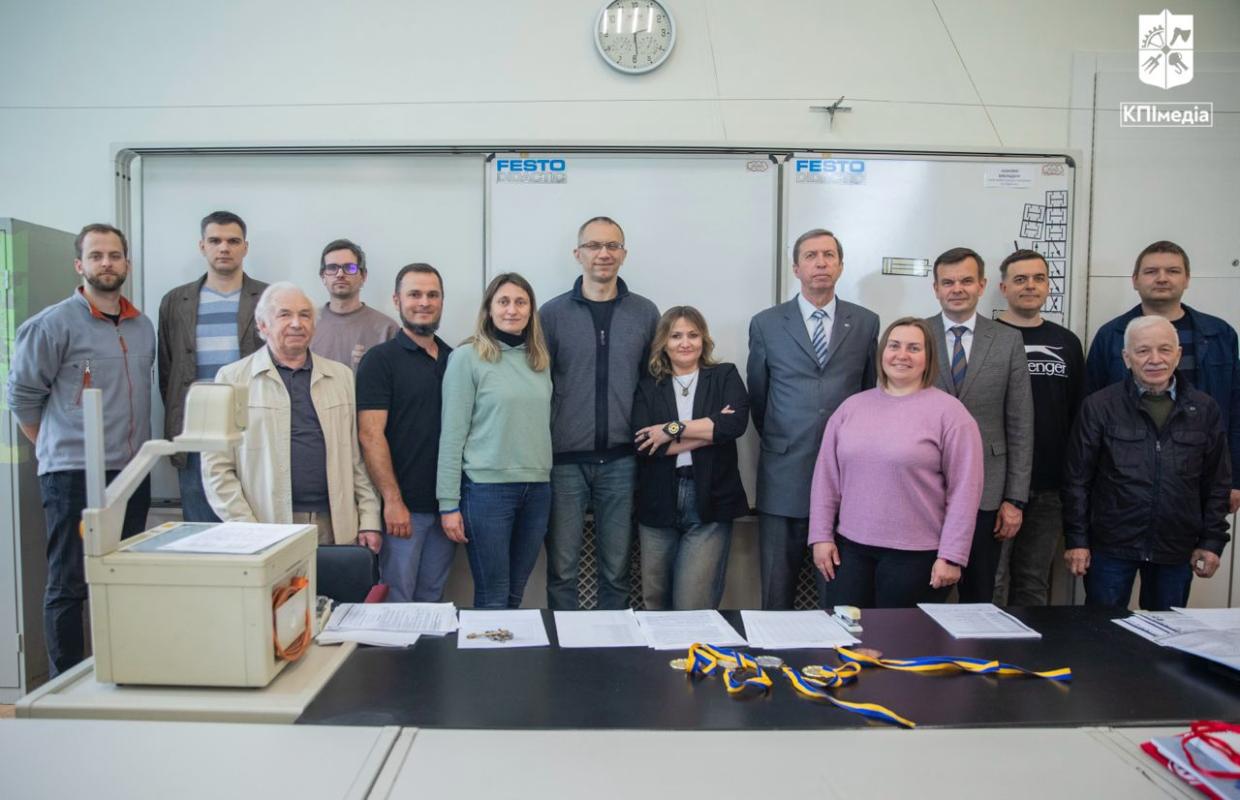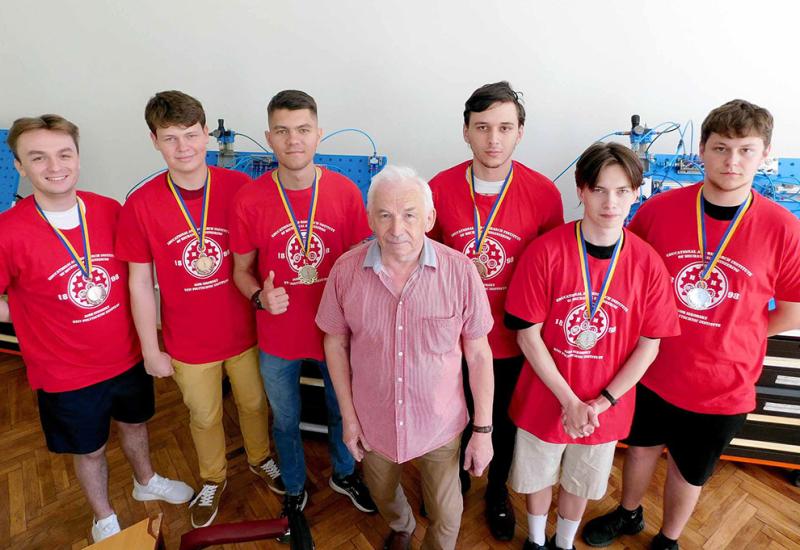The organisers of the university-wide open student competition ‘Mechatronics in Mechanical Engineering’, which was held in a face-to-face format on 13-15 May at the Department of Applied Hydroaeromechanics and Mechatronics (PGM) of the Igor Sikorsky Kyiv Polytechnic Institute of MMI, aimed to support talented students who are ready to solve urgent automation problems in modern production. For this purpose, during the competition, students created models of automated systems at the training stands of Festo (Germany).
📋
Oleksandr Hubarev, professor of the PGM department, who is one of the organisers of this year's and previous competitions, said that eight teams, including 20 representatives of the MMI and the Radio Engineering faculty, took part in the event. ‘The competition was held in four stages. It was about testing knowledge and assessing experience in pneumatic equipment control system, electric relay control system, PLC FEC Сompact control system (LD language) and PLC FC100 control system (ST language),’ said Oleksandr Pavlovych. ’Today we are dealing with automation systems that are a combination of mechanics, electronics and software. Competitions help to apply the basic principles and skills in industrial automation, allow us to set up, maintain and manage complex automated systems.’ He added that at all times of the Olympiad, the main thing was to help students apply their knowledge and experience, and its participants - both students, organisers and jury members - found common ground in defining tasks, in assessments, in solution methods, in the distribution of medals and certificates, and in their views on the future. Professor Gubarev also expressed his gratitude to his colleagues Yurii Onyshchuk, Andrii Zilinskyi, and Kostiantyn Belikov, who, during the three months of preparation for the Olympiad, prepared 458 different devices of pneumatics, electropneumatics, sensors, and sensors for operation, which worked well during the Olympiad.
The Olympics calendar was affected by the Covid-19 epidemic and Russia's large-scale military invasion of Ukraine. But, despite all this, the Olympiad was revived. This became possible thanks to the efforts of the entire staff of the PGM Department: the Olympiad is not only about competition days, but also about training, laboratory preparation, development of competition tasks, team support, work in the jury and the appeal committee, and, finally, determining the winners, etc.
According to the rules of the Olympiad, the teams that pass four exams at each stage - from theoretical problem solving on paper to implementation and debugging at Festo stands - win. To win, it is important to be able to work in a team: to distribute tasks among its members correctly, to interact in overcoming individual problems, and then to quickly combine the results obtained in solving an automation task. Time is of the essence, so teamwork and dexterity can be crucial in some cases to win.
Three teams and six winners and runners-up of the competition were identified. The first place went to the team of Dmitry Ostrovsky and Ivan Pidpalko, the second to Nikita Barduk and Dmitry Bely, and the third to Denis Ostapenko and Ilya Shkurin.
‘The tasks performed by the participants of the student competition ‘Mechatronics in Mechanical Engineering’ held at MMI are as close as possible to the real production tasks that engineers face every day - to plan, design a technologically advanced scheme, detect an error, and correct it. Such events allow us to train high-class specialists who are not afraid to test themselves in situations where, as they say, they need to fully demonstrate their acquired knowledge and skills.’ - said Vyacheslav Skrypnyk, Director of Hydro-Gid LLC (by the way, his company was one of the sponsors of the event).
When asked by a KP correspondent about his impressions of the Olympiad, its silver medallist Nikita Barduk said that he remembered the preparation for the event. ‘Checking the operation and adjustment of the technological equipment operating in the mechatronics laboratory requires periodic technical inspection and repair. This allowed us to thoroughly understand the structure and operation of complex equipment, to learn the basic principles and fundamentals of industrial automation. However, in the course of troubleshooting mechatronic control systems using diagnostic software, I had to read many primary sources: from technical manuals, catalogues, to thick textbooks published in previous years... My team took second place at the Olympiad, and it was nice because it proves that you can really achieve your goals in a short time, and all this during ‘races’ around the equipment and brainstorming sessions. It is at such moments that stress resistance makes all the difference. I agree with the opinion that I heard from the organisers that during a tense situation when solving a specific task during the competition, we do not rise to the level of our expectations, but find ourselves at the level of our training. I am sincerely grateful to the teachers who provided solid knowledge that will become the basis for successful further development as an engineer and scientist.’
For reference:
The Department of Applied Hydroaeromechanics and Mechanotronics of MMI has been holding the All-Ukrainian Student Olympiad ‘Mechanotronics in Mechanical Engineering’ since 2009. Among the organisers is Professor, Academician of the National Academy of Sciences of Higher Education, Honourable Worker of Education of Ukraine Oleg Mikhailovich Yakhno. Before Russia's large-scale aggression in Ukraine, the all-Ukrainian competition was considered the second stage of the Olympiad, but in fact it was the third stage, as most of the participants had been trained at the Summer School of Mechanotronics held at KPI. At one time, synergistic mechatronics encouraged mechanics, computer specialists, specialists in integrated systems, bioresources and environmental management, builders, food scientists, electronics engineers, forestry and mechanical engineering specialists from many Ukrainian universities to cooperate. In the first years of the competition, only students of mechanical engineering faculties took part in it. However, over the years, everything has changed - now those who are pursuing higher engineering education in other specialities can also join.
A three-day student Olympiad "Mechatronics in Mechanical Engineering" was held at Kyiv Polytechnic.
About 20 KPI students competed for the championship in applying the basics of mechanics, electronics, electricity and automation to solve problems that arise in real production. They also launched their own automated systems at FESTO's training stands.
MMI students Dmytro Ostrovsky and Ivan Pidpalko won the gold medal.

The student competition "Mechatronics in Mechanical Engineering" has started at Kyiv Polytechnic.
Two dozen students are competing for the championship in the practical application of the basics of mechanics, electronics, electricity and automation to solve problems in production.
The Olympiad is supported by well-known Ukrainian companies such as Festo Didactic and Progresstech, which are very interested in mechatronics specialists. The future specialists will be able to work at various types of enterprises, from automotive and aircraft manufacturing to medical equipment production.

